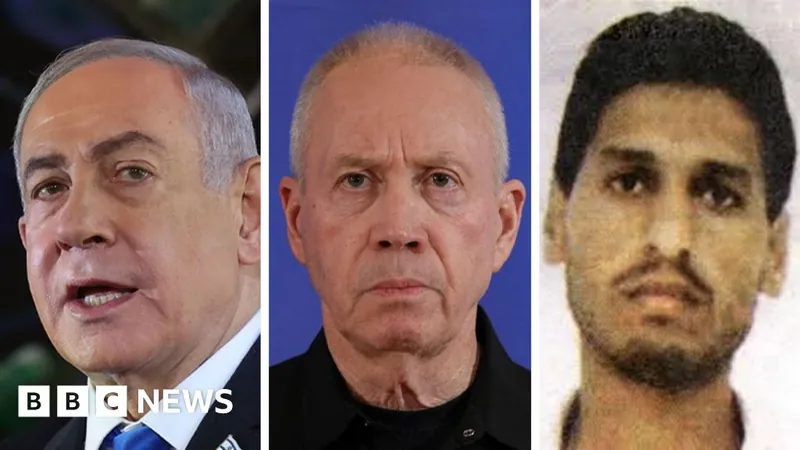
International Criminal Court Targets Netanyahu, Gallant, and Hamas Leader with Arrest Warrants
2024-11-22
Author: Ken Lee
ICC Issues Arrest Warrants
In a landmark decision, the International Criminal Court (ICC) has issued arrest warrants for prominent figures including Israeli Prime Minister Benjamin Netanyahu, former Defense Minister Yoav Gallant, and Mohammed Deif, a key military commander of Hamas, over accusations of war crimes and crimes against humanity.
Overview of the Ruling
The decision comes after a pre-trial chamber of the ICC dismissed Israel’s objections regarding the court's jurisdiction. This significant ruling underlines the ICC's role in addressing serious international crimes amid ongoing conflicts. The court stated there are “reasonable grounds” to believe that the three men bear criminal responsibility for atrocities committed during the recent Israel-Hamas conflict.
Reactions to the Warrant
Netanyahu condemned the ICC's actions as "antisemitic," while Hamas heralded the warrants as an "important historical precedent." The implications of these warrants largely hinge on whether the 124 member states of the ICC—excluding Israel and the United States—choose to enforce them.
International Response
In a conflicted response, the White House voiced its rejection of the ICC’s jurisdiction, aligning with Israel's position. Conversely, numerous European nations affirmed their support for the court's decisions, indicating a potential divide in international response.
Jurisdiction and Legal Authority
The ICC has jurisdiction to prosecute grave violations like genocide and war crimes, particularly where domestic prosecutors fail. This authority derives from the Rome Statute, which allows the court to act when national courts do not adequately address severe crimes. The ICC had previously recognized its jurisdiction over the occupied territories after acknowledging Palestinian statehood.
Context of the Charges
The prosecutor, Karim Khan, has been relentless in pursuing accountability, particularly after the catastrophic events of October 7, 2023, when a series of Hamas attacks in southern Israel left approximately 1,200 dead and 251 hostages taken. Israel’s ensuing military offensive has reportedly resulted in over 44,000 deaths in Gaza, raising significant humanitarian concerns.
Specific Charges
The specific charges against Deif include murder, torture, and other serious human rights violations, while Netanyahu and Gallant are accused of using starvation as a weapon and committing acts against humanity, including persecution and inhumane treatment. The ICC noted that these crimes were part of a broader assault on the civilian population.
Enforcement Challenges
While the arrest warrants elevate legal pressure on the accused, immediate apprehension is unlikely. Both Netanyahu and Gallant could face hurdles when traveling abroad, potentially leading to their arrest in ICC member states. Calls for action have already emerged from several EU countries, including Italy and the Netherlands, which have expressed readiness to comply with the ICC’s directives.
Political Realities
However, political realities may complicate these intentions. Historical precedents show that enforcement of ICC warrants can be inconsistent, as evidenced by high-profile cases such as that of Russian President Vladimir Putin and former Sudanese President Omar al-Bashir, who evaded arrests during official visits despite standing warrants.
Reactions from Different Leaders
In reactions to the ICC's decision, Netanyahu proclaimed it a “dark day in the history of humanity,” framing the actions as a direct attack on Israel's right to self-defense. In contrast, Hamas declared the ICC’s actions a correction of longstanding injustices faced by Palestinians, emphasizing a newfound hope for accountability.
Palestinian Authority's Perspective
The Palestinian Authority viewed the warrants as a victory for international law, emphasizing the need for world leaders to reconsider their interactions with Netanyahu and Gallant. Grassroots sentiments reiterated calls for justice, with individuals like Munira al-Shami expressing hope that these legal developments might lead to accountability for the suffering endured by Palestinian victims of the ongoing conflict.
Conclusion
As the landscape of international law continues to evolve, the ICC's move stands as a testament to the complex interplay of power, justice, and accountability in some of the world’s most volatile regions. How member states respond could set significant precedents for future legal actions against war crimes globally.
Stay Tuned
Stay tuned as this story develops, and witness how the world addresses the urgent need for justice against those in positions of power.




 Brasil (PT)
Brasil (PT)
 Canada (EN)
Canada (EN)
 Chile (ES)
Chile (ES)
 España (ES)
España (ES)
 France (FR)
France (FR)
 Hong Kong (EN)
Hong Kong (EN)
 Italia (IT)
Italia (IT)
 日本 (JA)
日本 (JA)
 Magyarország (HU)
Magyarország (HU)
 Norge (NO)
Norge (NO)
 Polska (PL)
Polska (PL)
 Schweiz (DE)
Schweiz (DE)
 Singapore (EN)
Singapore (EN)
 Sverige (SV)
Sverige (SV)
 Suomi (FI)
Suomi (FI)
 Türkiye (TR)
Türkiye (TR)